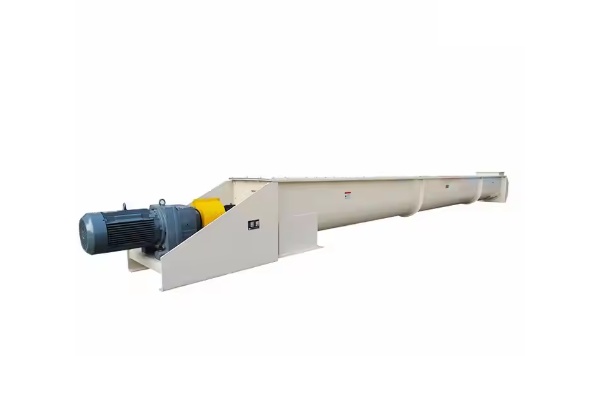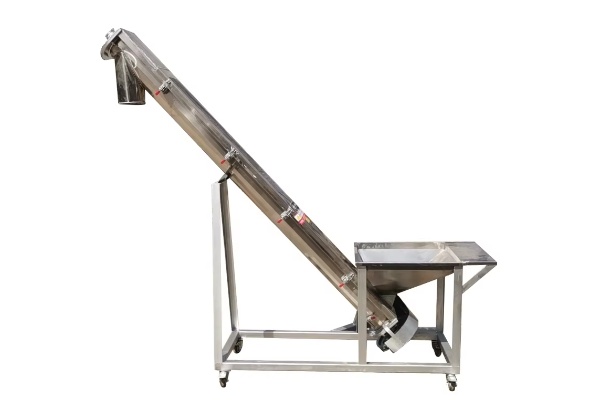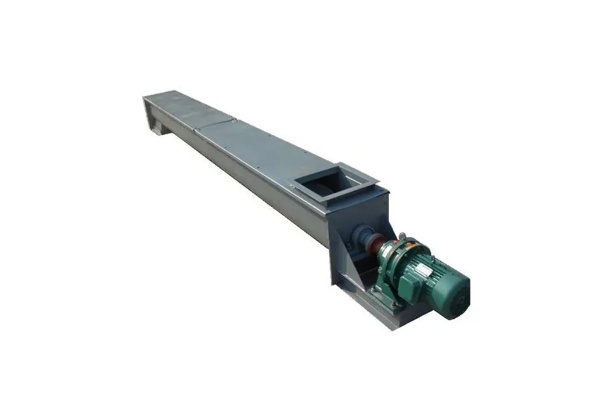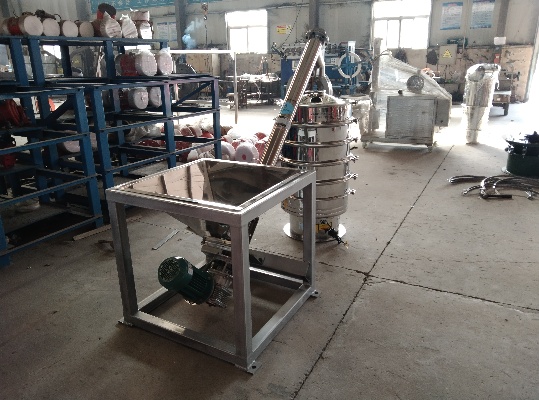Screw conveyor price
Thursday October-30 2025 17:20:40
There are significant differences in the price of Screw conveyor , and its specific quotation range is affected by a variety of practical factors. The price of screw conveyor ranges from $100 to $9,000 depending on the specific configuration of the equipment, the materials used, and the functional requirements. These influencing factors range from the basic size of the equipment (such as conveying length and screw diameter), the material selection of core components (such as carbon steel, stainless steel or special alloys), to the configuration of the drive system (motor power and reducer type), and even whether it includes complex control systems and additional customized functions.
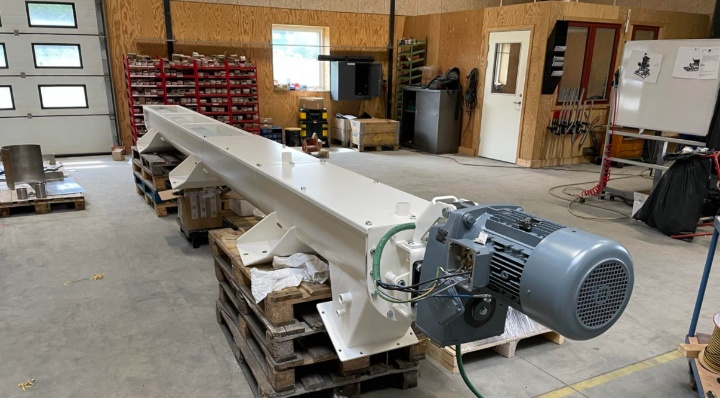
What are the types of screw conveyors?
Screw conveyors can be divided into three types according to the conveying angle: horizontal screw conveyors, inclined screw conveyors, and vertical screw conveyors. They have their own characteristics in terms of conveying capacity, conveying distance, and price:
Horizontal screw conveyor
Conveying capacity: Among the three types, horizontal screw conveyors can usually achieve a larger conveying capacity. Because the material is less affected by gravity in the horizontal direction, and the spiral blades can fully fill the conveying trough, the material flow resistance is relatively low, so the volume of material that can be processed per unit time is larger.
Conveying distance: Horizontal screw conveyor is suitable for conveying short to medium distances. Although it can be made very long in theory, an overly long horizontal screw conveyor may require more intermediate hanging bearings to support it, which will increase the resistance of maintenance points and material passing.
Price: Generally speaking, the price of horizontal screw conveyor is relatively low under the same conveying capacity and material requirements. Its structure is the simplest, and the manufacturing and installation costs are low.
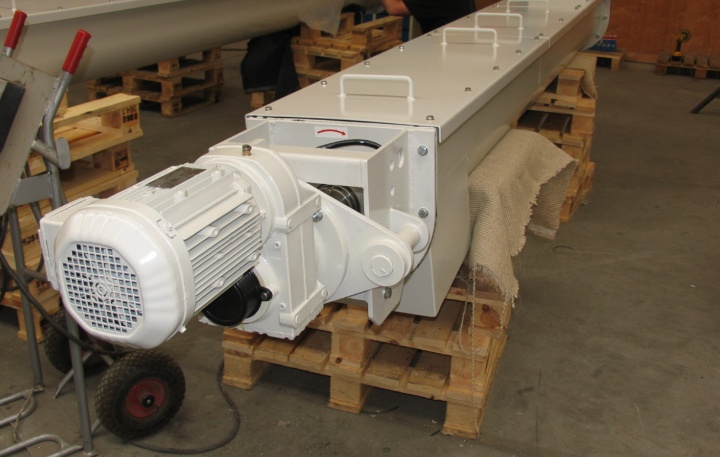
Inclined screw conveyor
Conveying capacity: The conveying capacity of the inclined screw conveyor will gradually decrease with the increase of the inclination angle. This is because when the material is conveyed upward at an angle, it will be affected by the downward component of gravity along the inclined surface, and some materials may slide down along the surface of the spiral blade, resulting in a decrease in conveying efficiency. The larger the inclination angle, the more obvious the decrease in conveying capacity.
Conveying distance: Inclined screw conveyor is suitable for conveying distances that need to cross a certain height difference. Its inclination angle is usually between 0 degrees and 45 degrees, which can not only achieve the lifting of materials, but also maintain a certain conveying efficiency.
Price: The price of inclined screw conveyor is usually higher than that of horizontal screw conveyor. Due to the need to withstand the axial force of the material along the inclined surface, a stronger support structure and greater drive power may be required, thereby increasing the manufacturing cost.
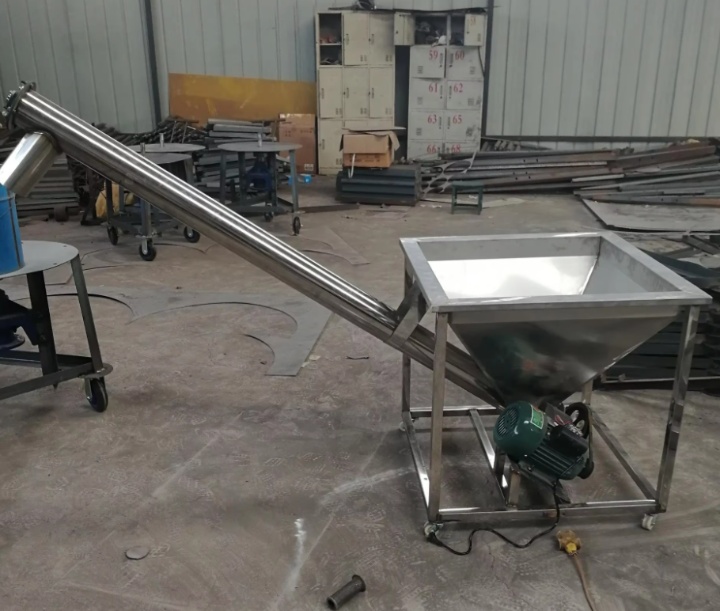
Vertical Screw Conveyor
Conveying capacity: The conveying capacity of the vertical screw conveyor is the smallest of the three. In order to overcome the gravity of the material and achieve vertical lifting, the vertical screw conveyor usually requires a higher screw speed and a specially designed screw blade, and even a forced feeding device, which limits the amount of material it can convey at a single time.
Conveying distance: The vertical screw conveyor is specially used to achieve vertical long-distance lifting of materials. It is suitable for occasions where space is limited or materials need to be conveyed to a very high height.
Price: The price of the vertical screw conveyor is relatively high. Its structure is complex, and it usually adopts a closed tube structure to prevent the material from falling back. It has higher requirements for the dynamic balance and bearings of the screw, and the drive power is relatively large. These factors all lead to higher manufacturing costs.
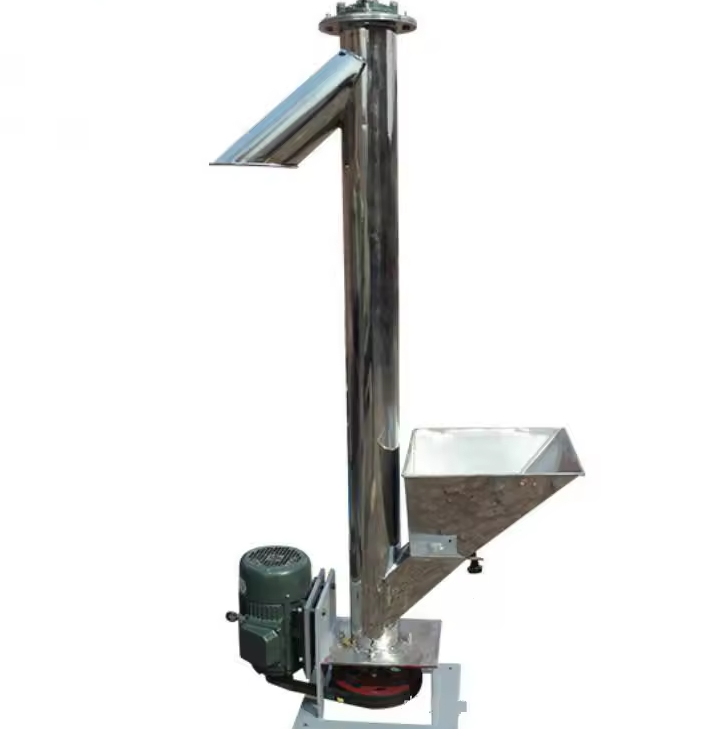
What are the factors affecting the price of screw conveyor?
The price of screw conveyor is affected by many factors, such as material, conveying specifications, drive system, special functions and customization. The following is an introduction to the factors affecting the price of screw conveyors:
Material selection
Carbon steel: relatively low price, suitable for conveying ordinary, non-corrosive materials with low sanitation requirements, such as coal, cement, grain, etc.
Stainless steel (such as 304, 316L): significantly higher price than carbon steel. Stainless steel has good corrosion resistance, high temperature resistance and hygienic properties. Among them, 316L stainless steel is usually more expensive than 304 stainless steel due to its superior corrosion resistance.
Special alloy or lining material: For working conditions that require conveying highly corrosive, abrasive or high-temperature materials, it may be necessary to use special materials such as nickel-based alloys, high-strength wear-resistant steel, or line the trough with ultra-high molecular weight polyethylene, ceramics and other wear-resistant/anti-sticking materials, which will greatly increase the manufacturing cost.
Conveying specifications and design
Conveying length: The longer the conveying distance, the larger the screw shaft, trough, support structure and drive power required, and the price will rise accordingly.
Screw diameter: The larger the screw diameter, the stronger the conveying capacity, the greater the amount of material required and the complexity of the manufacturing process, thereby increasing the cost.
Conveying angle: From horizontal to inclined to vertical conveying, the price usually shows an upward trend. Vertical screw conveyors usually have higher requirements for structural strength, drive power and bearing design due to the need to overcome gravity, so the price is also high.
Structural type: The shaftless screw conveyor is more suitable for conveying viscous and entangled materials due to its unique center shaft-free design, but its manufacturing cost is usually higher than that of the shafted screw conveyor of the same specification. In addition, the U-shaped trough type is usually slightly cheaper than the circular tube type, but the circular tube type has better sealing.
Drive system and control
Motor power and brand: The larger the conveying volume, the greater the specific gravity of the material, the longer the conveying distance or the greater the inclination angle, the greater the motor power required.
Reducer type and brand: The reducer converts the high speed of the motor into the low speed and high torque required by the screw shaft. Different types (such as cycloidal pinwheels, gear reducers) and different brands of reducers differ in efficiency, noise, durability and price.
Control system: Whether it is equipped with a frequency converter, PLC automatic control system, overload protection device, etc. will increase the overall price. High-precision metering screw conveyors often integrate more complex control systems.
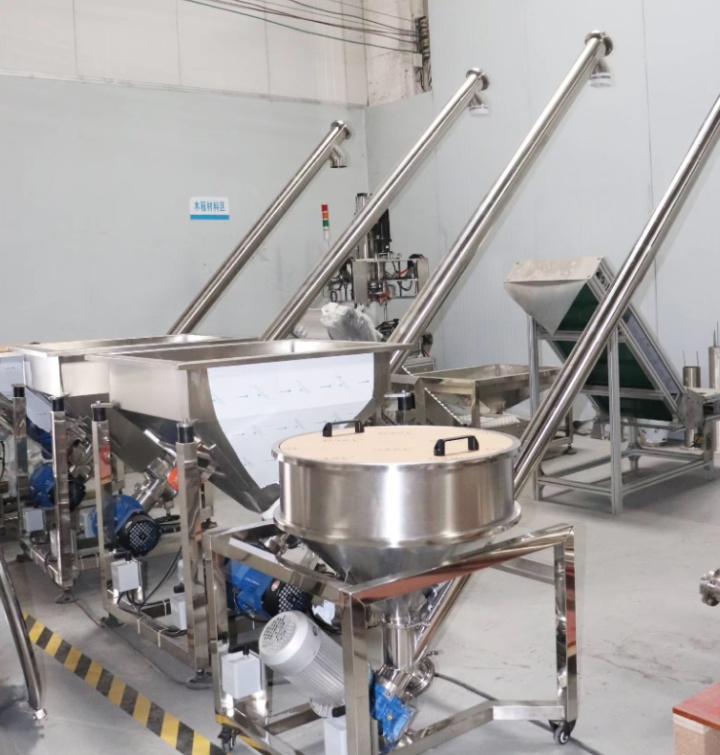
Screw conveyor supplier
There are many screw conveyor manufacturers, some specializing in material manufacturing, others supporting customized solutions. Our factory has extensive manufacturing experience and provides non-standard customized solutions. The screw blades, shafts, bushings, and materials such as carbon steel, stainless steel, and wear-resistant steel meet standard requirements. We offer various types of conveyors, including horizontal, inclined, and vertical conveyors, as well as U-shaped/tubular structures. Our equipment can seamlessly integrate with dust removal, packaging, and other equipment, reducing costs and time for our customers.
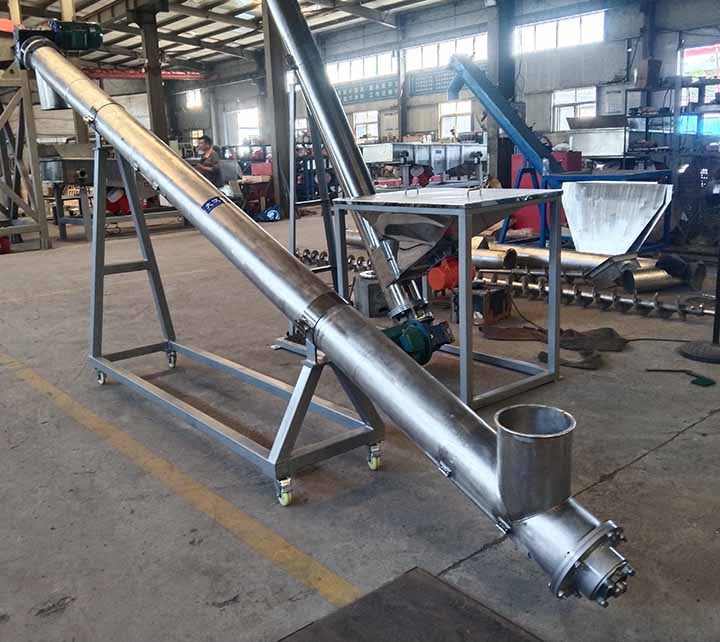
The final quotation of screw conveyors is a direct reflection of the complexity of their structure, the grade of materials used, the compatibility of the drive system, and whether specific functions are integrated. When choosing, users usually determine the specific configuration based on the physical properties of their own materials (such as abrasiveness, corrosiveness, viscosity, etc.), the required conveying capacity (hourly processing volume), the actual situation of the conveying path (horizontal, inclined or vertical), and the requirements for equipment sealing and maintenance convenience. These requirements are directly related to the manufacturing process, component selection and assembly complexity of the equipment.
